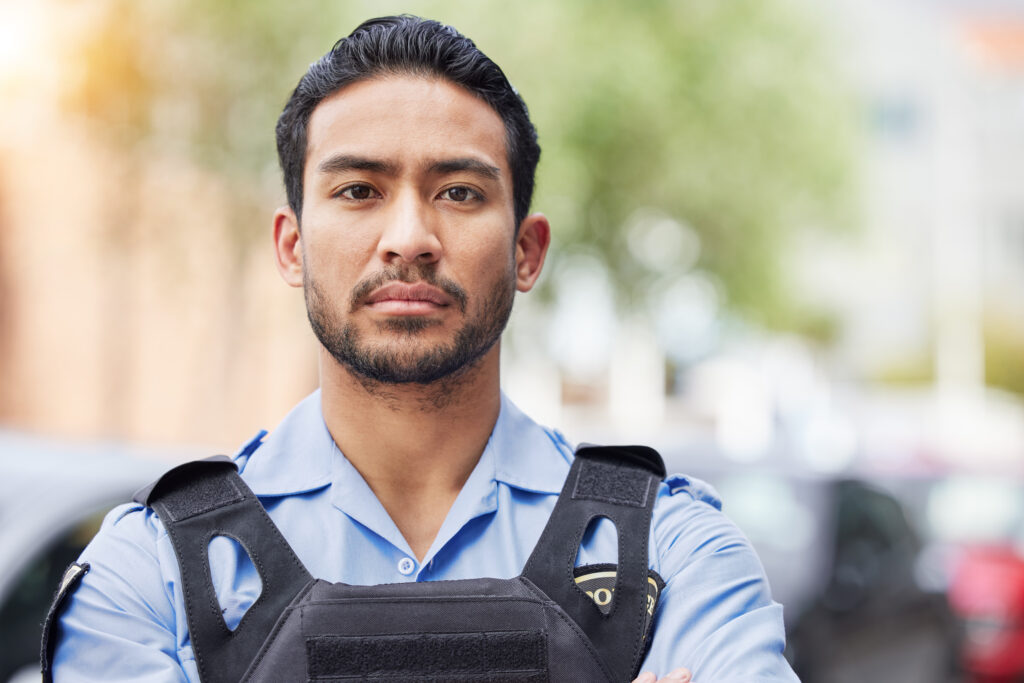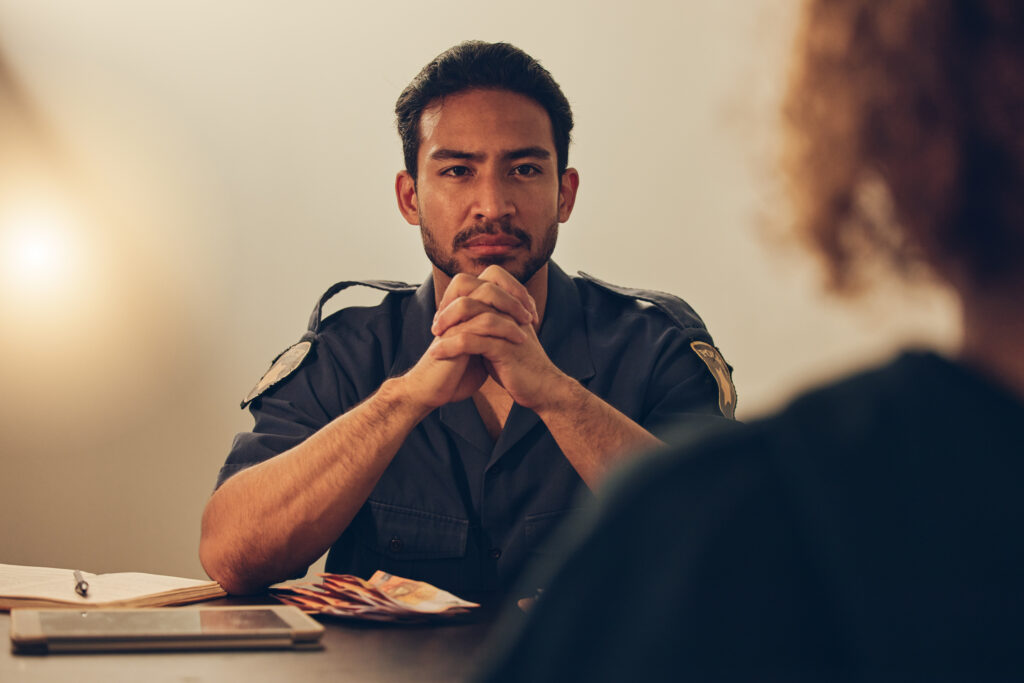
Law enforcement officers carry the weight of public safety on their shoulders, but often at the expense of their own mental well-being. ‘Behind the Badge: Addressing Mental Health Challenges in Law Enforcement’ delves into the silent struggles these professionals face, exploring the hidden epidemic of officer suicides, the impact of repeated trauma, and the barriers to seeking help. This article sheds light on the innovative strategies and systemic changes needed to support the mental health of those who protect and serve.

The stark reality of law enforcement is that the number of officers who die by suicide often surpasses those lost to line-of-duty deaths. The prevalence of suicide among police officers is a crisis that demands attention. In fact, law enforcement officers have a 54% increase in suicide risk compared to civilians.
The burden of repeated exposure to traumatic events and the lack of adequate mental health support contribute significantly to these alarming statistics.
Furthermore, the data reveals a disturbing trend: 34.1% of officers have contemplated suicide during their lifetime, and 11.4% have done so within the last year. These figures are a sobering reminder of the mental health challenges that officers face daily.
| Year | Officers Contemplating Suicide | Officers Planning Suicide |
| Lifetime | 34.1% | 15.9% |
| Past Year | 11.4% | 4.6% |
It is essential to recognize that behind every statistic is a person who has dedicated their life to public service, often at the cost of their own mental well-being.

Repeated exposure to traumatic events is a stark reality for police officers, leading to a higher prevalence of mental health disorders. The toll of this repeated trauma is evident in the rising numbers of mental health issues among officers. A survey conducted with the University of Regina highlights that RCMP members are significantly more likely to suffer from mental health disorders compared to the general population.
The types of mental health conditions prevalent among police officers due to these exposures include:
The delicate balance of managing professional duties and personal life is a constant challenge for officers. The reintegration into family life after confronting daily adversities is a testament to their resilience and the support of their families.
The data underscores the urgent need for comprehensive mental health support within law enforcement agencies. It is not just the officers who bear the brunt of these challenges, but their families as well, who are often the unsung heroes in the narrative of law enforcement resilience.

The first step in fostering conversations is to destigmatize mental health within the law enforcement community. By promoting an environment where officers feel safe to discuss their struggles, we pave the way for healthier minds and a more resilient force.
It’s not just about changing policies, but also about nurturing a culture where seeking help is seen as a sign of strength, not weakness.
The narrative of redemption and recovery among officers who confront their mental health challenges is a powerful testament to the need for open conversations. These stories underscore the importance of proactive strategies like therapy and mindfulness, ensuring that those who serve can also heal.

In the face of rising concerns over the mental health of law enforcement officers, mandatory wellness psychological training has emerged as a critical component in the broader strategy to enhance officer wellbeing. This training is designed to equip officers with the skills necessary to manage stress, recognize signs of mental health issues, and seek appropriate support.
Key elements of this training include:
The goal is to proactively identify and address mental health challenges before they escalate, fostering a culture of resilience within the force.
The implementation of such training programs is not without its challenges. Officers must contend with the stigma surrounding mental health, bureaucratic hurdles, and a complex support system. However, the benefits of this training are clear: improved morale, enhanced professionalism, and a more positive, service-oriented staff.

The introduction of annual psychological health screenings is a proactive step towards safeguarding the mental well-being of law enforcement officers. These screenings are designed to detect early signs of stress, anxiety, and other mental health issues, potentially preventing more serious conditions from developing.
Annual screenings provide a structured opportunity for officers to discuss their mental health in a confidential setting, ensuring that those who serve our communities do not have to struggle in silence.
To effectively implement these screenings, a multi-faceted approach is necessary:
The data from these screenings can be used to tailor support and training programs, ensuring that officers receive the help they need to maintain their mental fitness for duty.

Mental Health Co-Response Teams (CRTs) represent a transformative approach to public safety, where law enforcement officers and mental health professionals work in tandem. These teams are designed to respond to mental health crises with both authority and empathy, ensuring that individuals receive the appropriate care and intervention.
The success of CRTs lies in their ability to address situations with a dual perspective, combining the enforcement of law with a deep understanding of psychological well-being.
The collaboration between the NYPD and DOHMH under the Co-Response Teams initiative is a prime example of this innovative strategy. By including mental health experts in crisis response, the teams aim to de-escalate potentially volatile situations and connect individuals to necessary support services. This pre- and post-crisis intervention model has shown promise in bridging the gap between community needs and traditional law enforcement methods.
Continuous community engagement and support are crucial for the CRTs’ effectiveness. Their presence at events like ‘Coffee with a Cop’ in Santa Barbara County illustrates the commitment to a more integrated approach to public safety, where mental health is given the attention it deserves.

In the quest to build a resilient police force, comprehensive mental health initiatives are pivotal. Full psychiatric services, including psychotherapy and supportive counseling, are fundamental to these efforts. Substance use and detoxification treatment, alongside benefits enrollment and housing assistance, form a holistic approach to officer wellness.
These initiatives are not just about responding to crises; they’re about preventing them by fostering a culture of support and proactive care.
The Mental Health Co-Response Teams exemplify a step forward in this direction, offering a glimpse into a future where law enforcement and behavioral health partnerships thrive. By making available external programs for trauma support and implementing mandatory wellness training, we pave the way for a healthier, more effective police force.

Creating supportive environments for officers is essential for their mental and emotional well-being. Integrating trained professionals and faith-based volunteers during shifts can build rapport and provide guidance for work-related stressors. These initiatives foster a culture of care within the force, which is crucial for officer resilience.
Proactive measures, such as mandatory wellness psychological training and annual health screenings, are vital. They not only support officers in need but also identify and address mental health issues early on, preventing escalation and ensuring a healthier police force.

To foster a healthier police force, investment in occupational health services is crucial. These services must be staffed adequately, ensuring that officers have ready access to mental health care without financial or logistical barriers.
Key initiatives include:
By integrating the physical, emotional, and mental health of officers, we create a multifaceted approach that equips law enforcement agencies to better support their personnel.
Investing in these services not only aids in the immediate wellbeing of officers but also contributes to a more positive, service-oriented staff. This positivity is reflected in their professional duties, leading to improved staff/inmate interactions and a reduction in adversarial relationships.

Correctional officers are the unsung custodians of the criminal justice system, often facing a unique set of challenges that can take a toll on their mental and emotional well-being. The lack of time or failure to prioritize self-care is a significant issue, as officers are deeply ingrained in the culture of putting others’ needs before their own. This neglect can lead to a cascade of negative effects on their health and job performance.
Creating an environment that fosters officer wellness is crucial. Administrators must recognize that their most valuable resource is their employees and invest accordingly. Training in diversity, cultural awareness, de-escalation, conflict resolution, and stress management is essential for officers to navigate the complexities of the corrections environment effectively.
The study found that departmental discipline, job satisfaction, and strain-based work-family conflict were all significant correlates of compromised mental health among correctional officers.
Addressing systemic issues such as overcrowding, limited resources, and inadequate training is also vital. These factors contribute to the stress and potential trauma inherent in the corrections setting, affecting both officers and inmates.

Correctional facilities are increasingly recognizing the importance of officer wellbeing and safety. Implementing comprehensive wellbeing strategies is crucial for maintaining a healthy workforce and a safe environment. These strategies often include early identification of stressors and preventative measures to combat burnout and trauma.
Correctional officers face unique challenges that can lead to burnout and reduced job satisfaction. By improving work conditions and demonstrating organizational commitment, facilities can enhance overall wellbeing.
Mandatory wellness psychological training and annual health screenings are also becoming more common, ensuring that officers have the necessary support to manage the psychological demands of their roles.

To rebuild the fragile bridges between law enforcement and the communities they serve, a commitment to understanding community needs is paramount. In San Diego, the police department’s approach to ‘be part of the community’ rather than just policing it has been a cornerstone of their strategy.
Direct community engagement is not just a buzzword but a proven method for enhancing trust. For instance, in Los Angeles, officers took the initiative to knock on doors and make their presence known at local events, contributing to a significant rise in resident approval.
Fostering true engagement with the community goes beyond mere presence; it involves active listening, collaboration, and a willingness to adapt.
The following initiatives have shown promise in strengthening community relations:
These efforts, when combined with a modern approach that includes enhanced training and accountability, pave the way for a new era of cooperation and justice.

In the face of rising public mistrust, law enforcement agencies are recognizing the need for a shift towards a more empathetic and vulnerable approach. Fostering true engagement with communities is not just about policing within them, but being an integral part of them. This commitment to understanding and valuing community needs is crucial for rebuilding trust.
The conversation with Ashley Jones, an officer and growth expert, underscores the importance of vulnerability, empathy, and adaptability in policing. Officers often grapple with the expectation to maintain a stoic facade while dealing with personal battles and the complexities of mental health. Ashley’s insights highlight the struggle to preserve integrity and well-being in such a demanding profession.
Embracing vulnerability and empathy in law enforcement is not a sign of weakness, but a strategic move towards a more compassionate and effective policing model.
A modern, community-centered model of policing is emerging, one that is grounded in engagement, enhanced training, accountability, and technology. This model promises a new era of cooperation and justice, but it requires a concerted effort and investment from both the police and the community.
The evolution of law enforcement practices to effectively address mental health crises is a critical step towards a more humane and effective public safety system. The Mental Health Co-Response Teams are at the forefront of this transformation, offering a promising blueprint for other communities. These teams combine the expertise of law enforcement with that of mental health professionals to respond to crises with both safety and sensitivity.
The success of integrated mental health and law enforcement initiatives relies on a commitment to continuous learning and adaptation, ensuring the well-being of all community members.
The call for mandatory wellness psychological training and annual health screenings underscores the proactive approach needed to maintain officer mental health. By identifying issues early, law enforcement can prevent crises before they occur, fostering a resilient force ready to handle the complexities of modern policing.
In conclusion, ‘Behind the Badge’ has shed light on the critical mental health challenges faced by law enforcement professionals. From the alarming rate of officer suicides to the daily struggles with trauma and stress, the need for systemic change is undeniable. The insights from experts like David Berez and Ashley Jones, along with the initiatives such as mandatory wellness training and psychological screenings, point towards a path of resilience and well-being. The vision of a police force equipped to handle mental health challenges is not only ambitious but essential for the safety and integrity of both officers and the communities they serve. As we continue to advocate for supportive environments and proactive mental health strategies, it is clear that the journey toward a healthier law enforcement culture is both a collective and individual responsibility. The ‘Behind the Badge’ report is a call to action for all stakeholders to prioritize the human side of policing and embrace a future where officer wellness is a cornerstone of public safety.
Officer suicide is a significant issue in law enforcement, with many more officers dying by suicide than are killed by firearms, traffic-related incidents, or any other cause.
Recommendations include mandatory wellness psychological training and annual psychological health screenings to proactively identify and address mental health issues.
The vision is to create a police force that is not only effective in its duties but also resilient to mental health challenges, through comprehensive mental health initiatives and support systems.
Correctional officers face numerous challenges, including the external stresses of their demanding jobs, stigma, bureaucratic obstacles, and inadequate support systems.
Mental Health Co-Response Teams offer an alternative to traditional law enforcement responses to mental health crises, focusing on understanding and addressing the root causes of behavior.
Vulnerability and empathy are crucial in policing as they help officers navigate the complexities of mental health within the force and maintain integrity and personal well-being.
